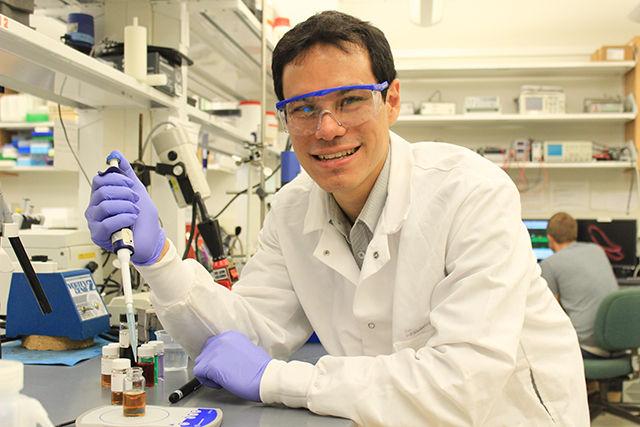Alexander Richter, an NC State graduate student holding a doctorate in the department of chemical and biomolecular engineering, has been awarded the $15,000 “Eat it!” award in the Lemelson-MIT National Collegiate Student Prize Competition for his work with agricultural pest control using biodegradable nanoparticles.
The Lemelson-MIT National Collegiate Student Prize Competition awards graduate students and undergraduate teams for their inventions that address problems in both developed and developing economies. Richter, the first student in North Carolina to earn the grant, addresses the problem of global food insecurity.
According to Richter, there are many applications of this technology and the particle system used to make these biodegradable nanoparticles that will increase their effectiveness.
“Since it has a degradable design, it also opens up new markets,” Richter said. “Applications that we see is that this technology can actually result in cost effective crop protection products to increase yields and to reduce the environmental burden on the soil, and in principle, to help feed the growing population of the world.”
The U.S. Census Bureau’s 2014 National Projections reports that the U.S. population alone is expected to increase from 319 million to 417 million between 2014 and 2060. Improvements in pest management could potentially help future crop yields and the health of the environment.
“In general, I believe technological advances can help society,” Richter said. “They can help society, they can help customers, they can also help the environment, basically having environmentally friendly solutions with technological advances.”
Richter said he has had an interest in the sciences since early childhood. In 2006 he decided to go back to college to pursue engineering education.
“As an engineer, one can solve pressing challenges,” Richter said. “They can pertain to human life. They can pertain to simple problems that certain customers have and companies have, and I wanted to pursue that especially in the field of nanotechnology.”
Richter, originally from Austria, had spend a semester overseas in New York. While there, he worked with Professor Ilona Kretzschmar researching janus particles and particle assembly. At that point, Richter met Professor Velev, a doctorate holder who is Richter’s current graduate advisor here at NC State.
“He was an invited guest speaker from the same field, and I was very interested in his field, what he’s doing, and his research, and based on that, I decided to join NC State later as a Ph.D. student and pursue studies in chemical engineering,” Richter said.
Richter has a background and degrees in environmental engineering as well as chemical engineering. Richter said he also decided to pursue studies in nanoscience because it is a field that will impact multiple industries and the environment.
“One problem that nanoparticles currently have is that while they’re highly functional, and one appreciates their function, they may stay active post-use potentially in the environment,” Richter said.
According to Richter, if the nanoparticles go into a wastewater stream for instance, and they are antimicrobial, they may affect bacteria in the wastewater treatment plant or beyond.
“We teamed up with the environmental protection agency, which is actually located here in Raleigh for this project, to develop, in this case, nanoparticles that are functional — they have the same functionality as current nanoparticles — but have a degradable design,” said Richter.
According to Velev, he and his colleagues had been discussing how to replace the non-degradable nanoparticles with biodegradable ones prior to Richter coming to NC State.
“When Alex joined, he was actually the person to bring this to proof of concept,” Velev said. “That is, before it was just a concept, and he obtained the research results and had been thinking of how to improve it, and how to demonstrate that this works. He had been designing the experiments, so he really made the whole thing already proven as a result rather than being a simple idea.”
Now Richter is trying to scale up this project as cofounder of Benanova Inc., an NC State startup focused on developing sustainable nanotechnology. The engineering components and entrepreneurial components go hand in hand.
According to Velev, Richter’s ability to collaborate and put together a team is one of the reasons that he’s been so successful.
“If you go outside of your research scope and then start working with people, such as how Alex worked with the environmental protection agency, with companies, other universities, [and] put together a team and bring the expertise of everybody to make sure that you validate your research and that you benefit from everybody’s insight,” Velev said.
According to Richter, there has been a lot of collaborative work and support amongst colleagues, the chemistry department, with Velev, the EPA, the office of international services and more.
“It’s a project that involves many people on many levels, and I also wanted to thank them,” Richter said.








